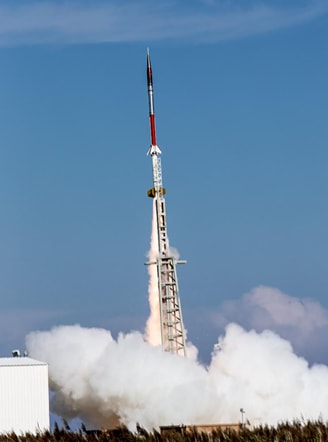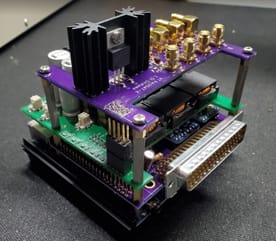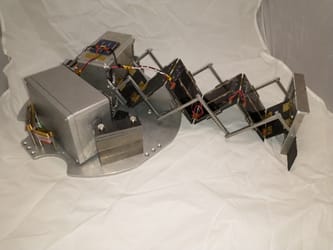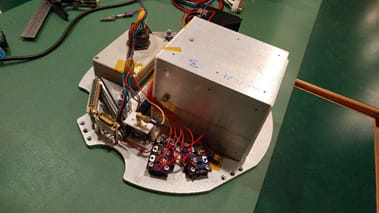VT RockSat-X 2021

RockSat-X @ VT: Our Mission:
The RockSat-X program is an initiative by the Colorado Space Grant Consortium in conjunction with NASA’s Sounding Rocket Program Office (SRPO) to provide low-cost access to space for university student design teams. Teams are allotted a modular payload space on a sounding rocket which is launched every August from NASA Wallops Flight Facility in Virginia. The Virginia Tech team has participated in the program since 2014 and has successfully completed a variety of experiments. Our overarching mission is to demonstrate and advance space-based technology for the benefit of the public. Your gift to our project will ensure we have the resources we need to continue providing our fellow Hokies with valuable real-world experiences and conduct innovative research on the national stage.
Current and Previous Projects:
2022: Electric Field Sensor Development:
Advancing ionospheric science and space weather instrumentation to benefit researchers in this area.
With the Direction Finding mission about 80% complete at the start of the 2021-2022 school year, the team was looking for an additional experiment to fly in August 2022. Through this school year, about 2/3rds of the team is focused on developing a new electric field sensor for use on sounding rockets. The team will work with experts from Space@VT to advance research in the field of ionospheric science and space weather, and the mission will also serve as a platform for over many new Freshman and Sophomore members to learn about space mission design and have an entry point to what this team is all about.
2021-2022: Direction Finding of ADS-B Signals:
Demonstrating radio frequency and signal processing capabilities in space

Started in the 2020-2021 school year, this payload will focus on the development and implementation of a direction-finding system that will receive and record aircraft position packet (ADS-B) signals using a 4 element antenna array deployed from the payload deck out the side of the rocket body. The signals received from the antenna array will be fed into two Software Defined Radios for processing, storage, and data downlinking. A suite of sensors monitoring payload temperature, acceleration, rotation rate and other variables, as well as an on-board camera, will allow the team to monitor flight variables and payload functionality. Deployment of the antenna array will be accomplished through the implementation of a telescoping deployment mechanism.
2020: CubeSat Form-Factor Deployable Solar Array:
Improving power generation for future CubeSat missions allowing them to accomplish more with more power.

Launched in August 2021, our team has developed a CubeSat form factor deployable solar array in order to demonstrate a potential avenue for enhanced power generation on CubeSat missions. This deployable allows for missions to compensate for solar power generation area lost to instrumentation on other faces of the CubeSat and can enable the use of technology with high power requirements.
2018: ThinSat Deployment:
Carrying high school students' experiments to space to inspire younger students to pursue careers in science & engineering.

The team developed a platform to utilize the RockSat-X sounding rocket launch opportunity to support STEM education and outreach at local high-schools, where they could learn valuable engineering and design experience. In 2018, three teams from two classes at Blacksburg High School (BHS) designed, developed, and built experiments for thin satellites that would be deployed in space, gathering critical scientific information, and transmitting it for post-mission analysis.
For more information about the RockSat-X program and to see all previous missions from all schools, please visit:
https://spacegrant.colorado.edu/national-programs/rs-x-home
Our Team:
Our team consists of 30+ Virginia Tech undergraduate students of all class years and multiple majors, including mechanical, electrical, and aerospace engineering, computer science, and materials science and engineering. We also enlist the help of 7 subject matter experts and advisors from Virginia Tech, Northrop Grumman, and Boeing. Each Fall we create a conceptual design and participate in several design reviews with subject matter experts from the Virginia Tech community, our industry partners, and the RockSat-X program staff. In the Spring, our design is manufactured and tested. In the summer our payload is integrated and is launched from NASA Wallops Flight Facility. By participating in VT RockSat-X, members gain skills and knowledge to be used in real world engineering, including CAD, electrical design, manufacturing, and test planning.
Previous members have gone on to apply these skills at companies and organizations such as NASA, SpaceX, Northrop Grumman, Boeing, and Lockheed Martin. Several alumni have continued their studies by earning master’s degrees and PhDs in fields related to space mission design. A few of our alumni are even responsible for co-founding their own space mission design software startup based out of the Washington, DC area.
How You Can Help:
We rely on funding from multiple sources including private donors to make our projects possible. Each year, our team must cover expenses such as:
- program participation fees ($24,000 for the 2021-2022 year)
- parts and supplies for payload manufacturing (typically $6,000 - $10,000)
- lab and testing equipment
- transportation of the payload to the launch site and lodging costs for summer testing
$20
Stratosphere
A generous gift at this level helps to offset manufacturing expenses for next year's payload.
$50
Mesosphere
This charitable gift will go towards our total fees for the 2021-2022 year.
$100
Thermosphere
This gift will go towards our upcoming program fees and parts for next year's payload. Gifts made at this level will have their name printed on a PCB for the 2022 payload!
$250
Exosphere
This gift will go towards paying for program fees and expenses. With your bountiful gift, your name will be printed on the payload, and your name will be added to our private sponsors on our RockSat-X website!




